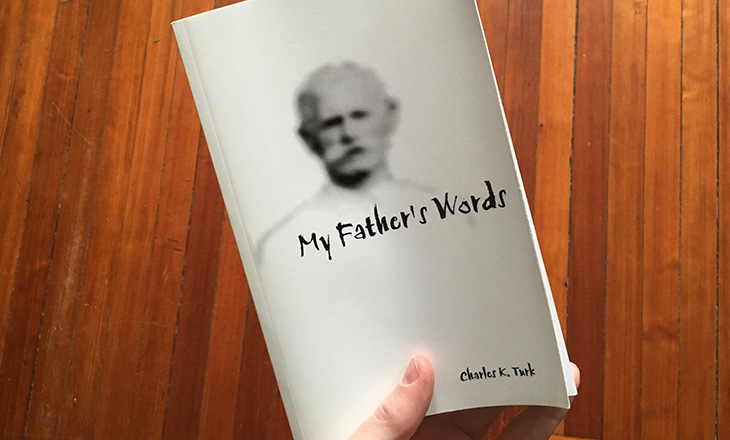I knew how to do an impression of Mr. Turk before I ever had him for AP English. His voice was gravelly, though not deep, with a measured cadence. After reading his memoir My Father’s Words and finding out his life story, the word that comes to mind to best describe his voice is weathered.
The impression that a classmate used to do was of Mr. Turk listening to an answer you gave in class. “Uh huh… uh huh… uh huh… uh, no.” The classic impression, though, was of Mr. Turk preparing the class for an essay. “Alright, gents, clear off your deskus.” Much like George H.W. Bush never having actually uttered, “Nah gah dah,” it didn’t matter that I never actually heard Mr. Turk say, “deskus.” It just sounded right somehow given his Hungarian accent.
I knew that he was Hungarian; his accent gave him away. I also knew that he had left Hungary a long time ago. Or maybe he escaped. I wasn’t sure which. I didn’t really inquire further either because I was a self-centered high school student or that I didn’t trust the accuracy of the answer that I would get from my classmates. Probably both.
He was an intimidating guy. I saw him laugh in earnest only once. It was when Brian Nasipak made a joke about the wordiness of James Michener. That’s exactly the kind of joke he would laugh at given how meticulous he was regarding the complexity of the English language. That’s the phrase I remember him saying over and over again, “the complexity of the English language.” His specialty was analyzing style. That’s what he taught his students. That’s what he taught me.
When I arrived in his class senior year, though, I was hopeless.
I was a great student. I won’t apologize for the boast given that I probably peaked intellectually and academically in high school. At that time, I simply did well in school. If there was an advanced class, I was in it. AP Calculus, AP Euro, AP American History, AP Physics, AP Chemistry. I had done well in advanced English junior year, so, naturally, I would be in AP English. I owe it in part to some natural intelligence but also, to a greater degree, a self imposed set of standards fueled by the anxiety of not getting into college and, hence, “ruining my life.” This is a common refrain for the high school student focused on college.
I remember watching a kid from a previous class talking to Mr. Turk about a subpar grade he got on a test or paper. It wasn’t a failing grade or anything, just a B or a C instead of an A. “Mr. Turk,” he said, “this is my life.” Mr. Turk scoffed. “It’s not your life.” I remember this random episode for two reasons. First, I was often that student pleading for his “life” and it was eye opening to watch that scene as a spectator. Second, it’s amazing to me that Mr. Turk put up with kids like us talking like that given what I now know about his life.
I had never analyzed style before. The normal cramming I could do the night before something was due wasn’t working. I was really lost.
I remember Brian Sprague reading an exemplary essay of his, chosen by Mr. Turk himself. He mentioned the author’s use of parallel structure. I had never heard that term before. So, I asked Mr. Turk after class. He sort of scoffed and said, “Boy you are in way over your head.”
I was pissed off. I was one of the best students in my grade and it’s not like I hadn’t learned everything about English at that school. But he could be blunt that way. In a classmate’s paper he once wrote, “you just don’t get it, do you?” in the margins. My friend Travis Worth, senior year told Mr. Turk that he had gotten into SUNY Geneseo to which Mr. Turk apparently replied, “Ah, that is a very good school, Travis. I’m surprised that you got in.” The best one, ever, though, was my given to my friend Jeff. Mr. Turk once said to him, “Oh, Jeffrey, the things that I could do if I had your talents.” “Thanks, Mr. Turk!” “Jeffrey, that was not a compliment.”
In the first major paper I wrote for him in the fall of senior year, I received one of his blunt bon mots. I was trying really hard to sound like I was analyzing style – something I still had no idea how to do – and in the margins of one of the pages he wrote, “surely you jest, sir.”
Needless to say, I hadn’t received my usual A. My “life” was on the line.
And so, naturally, my mom got involved.
“I’m calling him.”
“Mom, please don’t.”
“No, I’m calling him. ‘Surely you jest, sir?'”
“Mom…”
“Rob, he said at the parent teacher night that if we ever had any concerns, we could call him. I’m calling him.”
After that, I went to see Mr. Turk for help, to tell him that I was struggling. After that, during class, I started diligently taking notes. That year, I actually had a montage moment. You know in the movie where the protagonist buckles down and gets incrementally better, finally achieving mastery? Well, I actually did that in his class. My essays went from low B’s to high B’s, to A’s. My “life” was back on track.
My life.
Let me switch gears here and tell you a bit about the man I was coming to, the man who had to listen to students like me complain about their lives, that man that I really knew nothing about until the last week or so.*
As a young boy, he was under the rule of the Nazis. He watched a Jewish family in his village be taken away “to Palestine,” an event he would later learn was actually part of the Holocaust. After World War II, the Soviets moved in. At one point, they moved his entire village to another village in order to battle the Nazis. During this trip he watched a family get mowed down by a tank. His sister in law was hidden from Soviet troops in a stack of hay for three weeks to prevent her rape. On the way home, the people of his village navigated land mines set for the Nazis. While he was gone, his family’s farm was ruined. Later, the communists came to send any and all able-bodied people to Siberian labor camps. Mr. Turk was too young but his brother came forward to be sent to Siberia, rather than hide and subject his family to the torture they would surely face for his desertion. Due to his father’s ailing health, he took over the farm work at the age of ten. He was later forbidden from going to school by the local party because of his father’s ideological failings as perceived by the party. He was later recruited into the AVH as a young man and indoctrinated into communism.(The AVH was equivalent to the CIA and he was likely chosen as a political move to keep an eye on him and his family.) He escaped during the Hungarian uprising of 1956. He made a snap decision to run because he refused to shoot into a crowd of refugees that may have contained his brothers. He escaped by tripping border mines by throwing grenades on them (after having most likely murdered someone calling in orders to Russian troops). He was a refugee in Austria. He went to America knowing no English and with no education beyond the third grade. Because he told the Americans that he was a farmer and had no other skills, he was sent to work on a tobacco plantation for six months as little more than an indentured servant. He then finally made it to Buffalo to work in brick factories and steel plants while going to college, studying in a language he still had not mastered, earning a degree, starting a family, and, finally, some twenty-odd years before we crossed paths, becoming a teacher. Also, he was unable to see the family from whom he had been separated in 1956 until the fall of communism in the early nineties.
But my essay, though.
“Mr. Turk, this is my life.”
“It’s not your life.”
He wasn’t my favorite teacher nor was I his favorite student. His favorites were Joe Schaeffer and Chris Perri, both deserving of the favoritism. I’ve found that I rarely liked and respected teachers. It was usually either, sometimes neither, and with the exceptions of Fr. Costello and Mr. Countryman, very rarely both. I respected the hell out of Mr. Turk, though. And that was before I knew what he had been through.
He didn’t believe in shortcuts and he backed it up with his entire manner of being. With Mr. Turk, you either rose to the challenge or you didn’t. I rose to the challenge because I wanted to be worthy of his class. I was writing really solid critical essays with ease by the end of the class. I could have given you a dissertation on Light in August in May of 1995. I got a 5 on my AP English exam. I’m still proud of that 5 to this day. It means more to me than my college degree, that thing that was supposedly my life.
We were all so concerned with our lives but we had no idea what those were. We knew what we were told by our parents, by our suburbs. To have a good life you went to college and had a career to get the things our parents had, the things the alumni had, the things that we too would have provided that we didn’t fuck it up.*
But there are so many lives. I’m mystified by the unknown stories of the people I pass everyday. You never know who that person on the train is, who that lady at the DMV is, who that co-worker is, who that homeless person is, who that English teacher is.*
Mr. Turk’s story resonated with me these days because everyone is talking about totalitarianism and how 45 is the next Hitler and we’re living in a police state. After reading the experiences of a man who lived under both Hitler and Stalin, I have to say please stay vigilant but seriously, y’all, we’ve got a ways to go.
It also made me think – like so many things on this blog – about my own level of success. Mr. Turk came from a village in Hungary and ended up becoming an exemplary English teacher after having learned English in his twenties. There are no shortcuts but if you want something, you can achieve it. It’s cliche and bromidic but not untrue.
I didn’t work at steel plants to put myself through college. I’ve had it far easier. So, what do I want? What is it that I’m going after? This is my life.
There was one scene in the book that was particularly poignant. At one point, during his first college English class, Mr. Turk had to see a teacher who told him – I’ll paraphrase for the sake of the connection – that he was in over his head. After all, at this point, he had a third grade formal education and a GED. The teacher told him to keep writing essays every day and Mr. Turk eagerly awaited getting them back to see how he had improved. That man went on to teach me a great deal of the things I know about the English language. It’s inspiring.
*Parallel structure – “5 on the AP English exam,” possible headstone inscription.





I like this, very much.